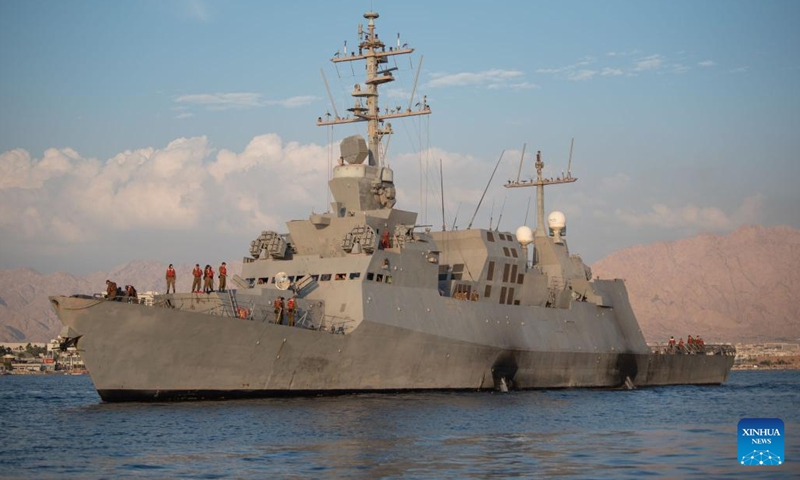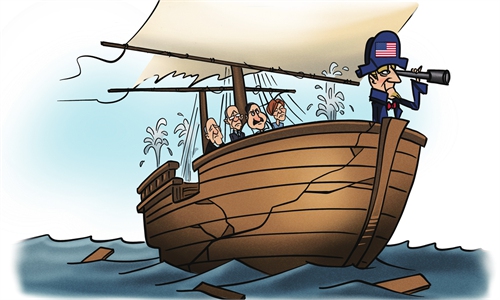US ‘low-cost’ warning to Houthi militia has little impact on settling Red Sea crisis

An Israeli Navy missile boat is seen in the area of the Red Sea on Nov. 1, 2023. Israel sent missile boats to the Red Sea, the army said on Wednesday after Houthi forces in Yemen fired missiles and drones toward Israel's resort city of Eilat.(Photo: Xinhua)
The "low-cost warning" issued by the US-led coalition to Yemen's Houthi rebels may not have a significant impact on easing tensions on the Red Sea waters, and the coalition's persistent use of military tactics could exacerbate the situation, analysts warned, calling for international efforts to achieve a political resolution to both the Red Sea crisis and a cease-fire in Gaza and to avoid further spillover of the conflicts in the Middle East.
On Wednesday, a group of countries led by the US, including Australia, Canada, Germany and Japan, warned Yemen's Houthi rebels of "consequences" unless they immediately halt sea attacks that are increasingly disrupting global commerce. The Biden administration described the joint statement as a final warning as he weighs possible military strikes against the Houthis if attacks persist, according to media reports.
In response to why China has not jointly condemned the Houthi militia, Chinese Foreign Ministry spokesperson Wang Wenbin said at a routine press conference on Thursday that China has always supported safeguarding the security of international waterways and rejected assaulting civilian ships.
The Red Sea is an important international transportation route for goods and energy. Ensuring the security and stability of the region serves the common interests of the international community. All parties should play a constructive role in safeguarding the security of the Red Sea transportation route, said Wang.
On Wednesday, the Houthi group in Yemen launched missiles targeting a cargo ship in the Red Sea. The group's military spokesperson Yahya Sarea said that the operation came after the ship's crew refused to respond to calls from the group, including fiery warning messages.
Given the US' current strategy in the Middle East and the spillover effect of the Palestinian-Israeli conflict, the US may intensify its operations targeting ships of the Houthi rebels in the Red Sea waters, Liu Zhongmin, a professor at the Middle East Studies Institute of Shanghai International Studies University, told the Global Times.
The expert noted that the likelihood of the US extinguishing the Houthi rebels in Yemen is low due to the complex political situation in the country and the regional diplomatic dynamics.
The Houthi militia's recent attacks on Israeli ships in the Red Sea were aimed at showing support for Palestine and asserting their presence in the region while seeking political transformation. Additionally, a US attack on the Houthi militia in Yemen would disrupt negotiations among the group, the Yemeni government, and Saudi Arabia, which would not align with US interests in the region, said Liu.
The "final warning" is the latest attempt by the US to deter the Houthi group, considering the US' limited resources in terms of fleets and soldiers for large-scale military operations in the region. The US also faces challenges in effectively attacking the decentralized militia group, which is hidden within Yemen's complex landscape, Ding Long, a professor with the Middle East Studies Institute of Shanghai International Studies University, told the Global Times.
Ding also noted that the US is believed to have no intention of escalating the Palestinian-Israeli conflict, and with the upcoming election, the Biden administration is aiming to avoid engaging in a new war. However, the crisis in the Red Sea may persist as the US-led escort alliance has not only failed to resolve the issue but instead heightened the risk of a larger conflict with the Houthi militia.
The root cause of the Red Sea crisis lies in the Palestinian-Israeli conflict, and resolving the crisis relies on a cease-fire in Gaza, said Ding.
However, the US deliberately avoids discussion of the connection between the Red Sea crisis and the Palestinian-Israeli conflict, attempting to portray them as isolated events and only emphasizing the illegality and harm caused by the Houthi armed group.
On Wednesday, the UN Security Council held its first open meeting on the continuing attacks by Houthi rebels in the Red Sea, during which Geng Shuang, China's deputy permanent representative to the UN, said that the current tensions in the Red Sea are one of the manifestations of the spillover effects of the conflict in Gaza.
"We call on the relevant party to cease assaulting civilian ships and respect and protect the freedom of navigation of all countries in the Red Sea. We believe that all parties, especially major countries with influence, need to play a constructive and responsible role in keeping the shipping lanes safe in the Red Sea," said Geng.
Ding noted that the escalating Red Sea crisis is evolving into a global security challenge that requires a collective response from the international community. The US and Western countries, in particular, should avoid exacerbating the situation and refrain from using military means to solve the Red Sea crisis and the Yemen issue.
Strengthening international coordination and seeking a political solution should be the international consensus for resolving the Red Sea crisis, said Ding.



